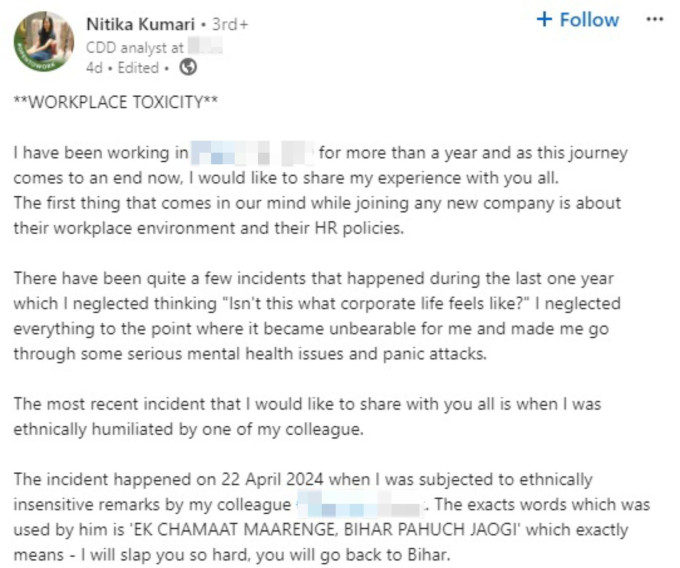Employee claims she was ‘ethnically humiliated’ at workplace: ‘Ek chamaat maarenge, Bihar pahuch jaogi’
The harsh realities of workplace discrimination have once again come into the spotlight with a viral LinkedIn post from a woman who hails from Bihar.
In a harrowing account, Hyderabad-based employee Nitika Kumari claims to have been subjected to “ethnic humiliation” by colleagues, with the shocking threat of being “slapped so hard” if she didn’t comply.

She recalled, “There have been quite a few incidents that happened during the last one year which I neglected thinking ‘Isn’t this what corporate life feels like?’ I neglected everything to the point where it became unbearable for me and made me go through some serious mental health issues and panic attacks.”
She added, “The most recent incident that I would like to share with you all is when I was ethnically humiliated by one of my colleagues. The incident happened on 22 April 2024 when I was subjected to ethnically insensitive remarks by my colleague. The exact words which were used by him are ‘EK CHAMAAT MAARENGE, BIHAR PAHUCH JAOGI’ which means — I will slap you so hard, you will go back to Bihar (sic).”
 The employee shared her experience on LinkedIn (Source: LinkedIn/Nitika Kumari)
The employee shared her experience on LinkedIn (Source: LinkedIn/Nitika Kumari)
Despite raising concerns with the HR department, her pleas for intervention allegedly fell on deaf ears. This disturbing incident underscores the profound mental and emotional toll that discrimination can have on employees, eroding their sense of safety, dignity, and overall well-being within the professional environment.
Psychological effects experienced by individuals who face ethnic discrimination in the workplace
Gurleen Baruah, organisational psychologist and executive coach at That Culture Thing, explains, “It’s important to understand the underlying reasons for ethnic discrimination. This often stems from an ‘us vs. them’ mentality, which creates divisions and tribalism, fuelled by insecurity and deep-seated biases. People on the receiving end of such discrimination bear the brunt of these attitudes.”
How individuals react to ethnic discrimination varies based on their personality, genetic makeup, and general approach to stress and challenges, she says. “Comments and actions rooted in discrimination can severely damage a person’s self-esteem, causing them to feel unwarranted shame. This can intensify the ‘us vs. them’ mindset, making the affected individuals view others as adversaries and widening the social gap.”
Strategies that are effective in addressing the mental and emotional toll of discrimination
Baruah reveals that while discrimination can occur in any workplace, it is often not a 100% accurate reflection of the organisation’s policies and ways of working. “Most organisations have strict anti-discrimination and anti-harassment policies. Unfortunately, since this is a people issue, such incidents may still occur.”
Therefore, it’s crucial for organisations to be vigilant and proactive. They should design and communicate robust Diversity, Equity, and Inclusion (DEI) policies, and regularly train employees on how unconscious biases and comments can contribute to harassment and perpetuate an ‘us vs. them’ mentality.
The organisational culture plays a critical role here, Baruah asserts. “If an employee reports an incident to leadership or HR, the response and actions taken are crucial. How the organisation mitigates the issue, whether the appropriate actions are taken, and whether the complainant feels heard and supported are all vital aspects.”
 How individuals react to ethnic discrimination varies based on their personality, genetic makeup, and general approach to stress and challenges. (Source: Freepik)
How individuals react to ethnic discrimination varies based on their personality, genetic makeup, and general approach to stress and challenges. (Source: Freepik)
It is imperative for leadership and HR to take corrective actions guided by ethics and morality, according to her. Additionally, organisations should foster a supportive environment by offering resources such as counselling services, employee support groups, and workshops on emotional resilience. Encouraging open communication and creating safe spaces for employees to express their concerns without fear of retaliation are also effective strategies.
Best practices for employers to proactively create a supportive and inclusive work environment
Employers can proactively create a supportive and inclusive work environment that not only prevents discrimination but also promotes the mental health and well-being of all employees by implementing the following best practices, as stated by Baruah:
Psychological safety training: Conduct training sessions focused on psychological safety, helping employees feel safe to take risks, express their ideas, and voice concerns without fear of negative consequences. Hire experts to deliver these kinds of sessions from outside.
Unconscious bias training: Implement regular unconscious bias training to help employees recognize and mitigate their biases. This can reduce discriminatory behaviour and foster a more inclusive culture.
Case studies and communication: Design and share case studies that highlight instances of discrimination and how they were effectively addressed within the organisation. Communicating these examples can reinforce the company’s commitment to handling such issues properly and transparently.
Open door policies: Encourage open door policies where employees feel comfortable approaching management or HR with their concerns. This helps in creating an environment where issues can be addressed promptly and effectively.
Counselling and mental health support: Provide access to counselling services and mental health resources. Offering Employee Assistance Programs (EAPs) can support employees dealing with stress, anxiety, or trauma related to workplace discrimination.
Disclaimer: The copyright of this article belongs to the original author. Reposting this article is solely for the purpose of information dissemination and does not constitute any investment advice. If there is any infringement, please contact us immediately. We will make corrections or deletions as necessary. Thank you.
